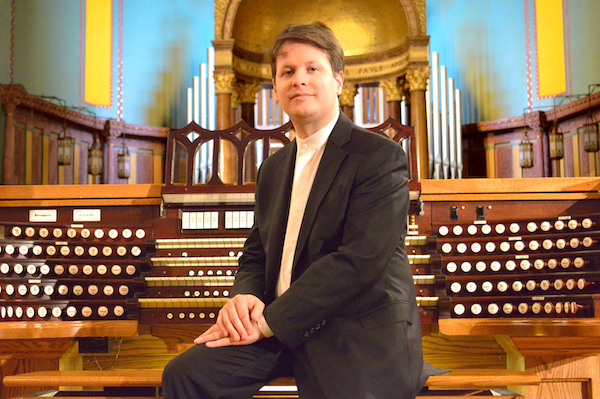Jacobs opens French organ series with user-friendly program

The esteemed organist Paul Jacobs is also a teacher, and the title of his Tuesday night recital had a professorial ring: “The Great French Organ Tradition.”
A dry title yet one that was belied by Jacobs’ expert playing and his personable stage manner. Paul Hall—at Juilliard, where Jacobs teaches—was unexpectedly filled to capacity for this first program in a three-concert survey of French organ music.
Why does the organ literature of France so dominate the instrument’s repertoire? The answer, as the program notes described and Jacobs explained from the stage, is a combination of history and technology. The country built new organs to replace those destroyed during the French Revolution and its aftermath, and in the process developed ways to improve the instrument’s dynamic range and the variety of colors.
French composers took to these new capabilities through the 19th century and, with several hundred years of organ literature to stand on, created what is now the preeminent romantic and modern repertoire.
Tuesday night offered something of an introduction to technique and styles, and a subtle outline of how this national tradition developed. There was music from César Franck and his colleague Camille Saint-Saëns, from Marcel Dupré and his student Jehan Alain, and a sonata from Alexandre Guilmant, who was essential for carrying this body of work around the globe in the late-19th and early-20th centuries.
Dupré’s Variations sur un Noël is a well-known work, and as Jacobs played it, a microcosm of the series. Along with the facility of his hands and agility of his feet, gliding across the keyboards and pedals respectively, the organist pulled out all the stops in preparation, juxtaposing an enormous range of orchestral colors, from an almost-too-intense nasal bassoon to ghostly, breathy flutes.
Jacobs spoke to listeners in succinct, friendly segments, at one point soliciting a show of hands from those attending their first organ recital, at another making a point of explaining to the whole audience some of the mysteries behind the organ. As the instrument and its performing tradition are seen as a weird step-sibling of classical music, this struck one as an example every organist should follow.
The reason Jacobs’ interpretations of Dupré, of Saint-Saën’s “Le Cygne”—from Carnival of the Animals—and Guilmant’s Sonata No. 1 in D minor sounded as they did was because they were just that—interpretations. More than in any other literature in classical music, organists interpret scores. Jacobs pointed out the exactitude of instructions common to the French school, while also explaining that an organist must make numerous decisions about which sounds to use; performances can thus differ in ways impossible to experience in other concert settings.
This was valuable because music like Guilmant’s Schumanesque Sonata and Franck’s Pièce héroique have an archaic and academic manner that, after more than 100 years of political and social history, can be observed but not felt—something even Jacobs’ playing, including his scintillating phrasing of a pedaled main theme in the Sonata, could not entirely overcome.
The more modern music, Naji Hakim’s sunny fandango, Tanets (a U.S. premiere), Alain’s haunting, mystical Le jardin suspendu, and Nadia Boulanger’s lovely architectural Trois pièces pour orgue, had plenty to say to a contemporary audience, and were unqualified pleasures. Along with its other aspects, the organ is heard more often as a power instrument, but Jacobs musicality and sensitive expression were to the fore in all these works.
The organist didn’t play an encore, instead delivering a great hook for the next concert in the series. “Do you want to hear the Widor Toccata?” he asked, “Then come to St. Mary’s next week!”
Paul Jacobs continues “The Great French Organ Tradition” 7:30 p.m. September 17, at the Church of St. Mary The Virgin, and 7:30 p.m., September 24, at the Church of St. Ignatius Loyola. juilliard.edu


